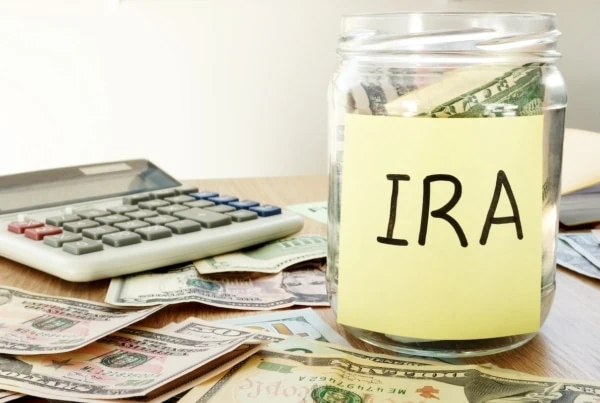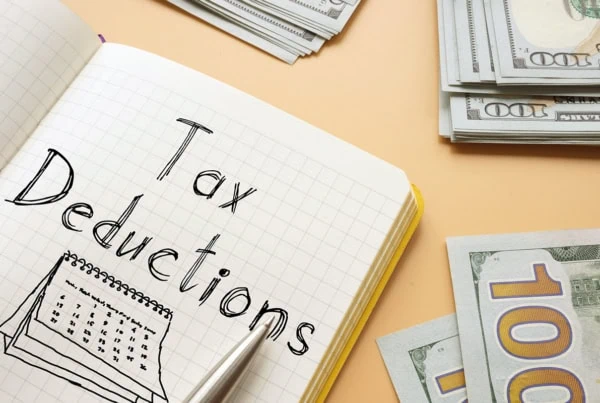Want to get on someone’s good side? Help them out financially? Or, perhaps, just make them really happy? Give ‘em a gift! (Cash is always nice.)
But if you’re in a gift-giving mood, and you have a lot of money, make sure you keep the federal gift tax in the back of your mind. Because if you’re not careful, you could wind up with a big tax bill.
Fortunately, there’s an easy way to avoid the gift tax altogether. Just make sure your gifts are below the gift tax exclusion amount for that year. Among the best things about the annual exclusion is that it applies on a per-recipient basis, and it can be doubly effective if you’re married.
The gift tax exclusion for 2026 is the same as it was in 2025, but one niche improvement is being implemented for 2026.
If you want to know more about the gift tax exclusion and how it works, check out my explanation below. I’ll also fill you in on the amount for 2026.
Related: Federal Tax Brackets and Rates
Gift Tax In General

The federal gift tax generally applies to the transfer of property (including money) from one person to another if nothing, or something of lesser value, is received in return. The tax is paid by the person giving the gift—not by the recipient.
Young and the Invested Tip: Gifts you receive are also exempt from federal income tax.
The federal gift tax rates are relatively high. They start at 18% and go all the way up to 40%.
When measuring the value of property for gift tax purposes, use the property’s fair market value (FMV) on the date the gift is made. The IRS defines FMV as “the price at which the property would change hands between a willing buyer and a willing seller, neither being under any compulsion to buy or to sell and both having reasonable knowledge of relevant facts.”
Fortunately, there are a few ways to avoid the federal gift tax. For example, as discussed further below, you won’t have to pay the tax if you don’t exceed either the annual gift tax exclusion or the lifetime gift tax exemption.
There are a few other exemptions to the federal gift tax, too. For example, the tax doesn’t apply to:
- Tuition paid directly to an educational institution for someone else
- Medical expenses paid directly to a doctor or other medical care provider for someone else
- Gifts to a spouse who is a U.S. citizen
- Gifts to a political organization
- Gifts to certain tax-exempt civic or business leagues, chambers of commerce, recreational clubs, and similar organizations
- Gifts to charities
Because there are several special rules and requirements for these exceptions, if you’re planning to make one of these types of gifts, it’s best to speak with a qualified tax advisor.
Related: 10 Financial Gifts for Babies, Kids & Grandkids
Annual Gift Tax Exclusion for 2026

As noted above, gifts of property with a FMV below the annual gift tax exclusion amount are not subject to the federal gift tax. For 2026, the exclusion amount is $19,000. The exclusion is typically adjusted each year to account for inflation, but 2026’s total is the same as 2025’s.
Young and the Invested Tip: The annual gift tax “exclusion” is sometimes referred to as the gift tax “exemption.”
The annual exclusion applies per person. So, if you’re married, you and your spouse can give a combined total of $38,000 to a family member or friend in 2026 (the same as 2025).
The exclusion also applies on a per recipient basis. So, in 2026, you can give up to $19,000—or up to $38,000 for a married couple—to as many people as you like without having to pay any federal gift tax ($19,000 and $38,000, respectively, for 2025).
Since it’s an annual limit, all gifts must be made by the end of the calendar year for the exclusion to apply (e.g., by Dec. 31, 2026, for the 2026 exclusion to apply).
The government has announced one change in the gift tax, however: The annual exclusion for gifts to a spouse who is not a U.S. citizen increases to $194,000 for calendar year 2026, up $4,000 from calendar year 2025.
Any gifts exceeding the annual gift tax exclusion must be reported to the IRS on a federal gift tax return (Form 709). However, that doesn’t necessarily mean you will owe any tax for those gifts. The federal tax on gifts only applies if the lifetime exemption amount is surpassed (I’ll cover the lifetime exemption is a minute).
Examples
Here are a couple of examples to show how the annual gift tax exclusion works.
Gifts don’t need to be reported on Form 709
Josh and Samatha are married with two married adult children and three grandchildren. In 2026, they give $30,000 to each child, $30,000 to each child’s spouse, and $15,000 to each grandchild. They don’t make any other gifts in 2026. Since none of their gifts exceeded the 2026 gift tax exclusion amount for a married couple ($38,000), Josh and Samatha don’t need to file Form 709 for 2026, and all $165,000 of their 2026 gifts are tax-free.
Gifts must be reported on Form 709
Dave is single with one married adult child and two grandchildren. In 2026, he gives $20,000 to his child, $20,000 to his child’s spouse, and $15,000 to each grandchild. He doesn’t make any other gifts in 2026. Since the $20,000 gifts to his child and his child’s spouse exceed the 2026 gift tax exclusion amount for a single person ($19,000), Dave must file Form 709 for 2026 to report those gifts. However, since the $15,000 gifts to his grandchildren are less than the 2026 gift tax exclusion amount, those gifts are tax-free and don’t need to be reported on Form 709.
Related: How to Give Stocks as a Gift in a Tax-Efficient Way
Lifetime Gift Tax Exemption for 2025

You’ll only owe federal gift taxes if the combined total of all gifts reported on Form 709 during your life exceeds the lifetime gift tax exemption.
For 2025, the lifetime gift tax exemption is $13.99 million. However, as with the annual exclusion, the lifetime gift tax exclusion is doubled for married couples (i.e., $27.98 million for 2025).
The Tax Cuts and Jobs Act of 2017 doubled the lifetime gift tax exemption from 2018 to 2025, but with a planned expiration of 2026, at which point it would revert to pre-2018 levels. However, the One Big Beautiful Bill (OBBB) has made the exemption permanent and set a floor of $15 million ($30 million for couples) starting in 2026. Those numbers will be adjusted higher for inflation starting in 2027.
Obviously, with exemption amounts so high, most Americans won’t ever have to worry about paying the federal gift tax. Generally, this is a tax paid by the rich.
Examples
The following examples illustrate how the lifetime gift tax exemption works.
No gift tax due
From 2017 to 2026, Andrew gave $150,000 as a gift to a friend each year. Since these are the only gifts he has ever given, Andrew has given a total of $1.5 million during his life. Andrew files a gift tax return for his 2026 gift reporting the $131,000 amount exceeding that year’s annual gift tax exclusion ($150,000 – $19,000 = $131,000). Andrew doesn’t owe gift tax at this time because the total amount reported during his lifetime ($1.5 million) is not above the $15 million lifetime limit for 2026.
Gift tax due
From 2011 to 2026, Cindy gave $1 million as a gift to her grandchild each year. Since these are the only gifts she has ever given, Cindy has given a total of $16 million during her life. Cindy files a gift tax return for her 2026 gift reporting the $981,000 amount exceeding that year’s annual gift tax exclusion ($1,000,000 – $19,000 = $981,000). Cindy owes gift tax on $10,000 of gifts because the total amount reported during her lifetime ($16 million) is $10,000 above the $15 million lifetime limit for 2026.
Related: Capital Gains Tax Rates
Lifetime Gift Tax Exemption and the Federal Estate Tax Exemption

Finally, it’s worth noting that the lifetime gift tax exclusion and the federal estate tax exemption are tied to one another in two important ways.
First, the two exemption amounts are equal (e.g., $13.99 million for 2025 and $15 million for 2026).
Second, and more importantly, any gifts counted toward your lifetime gift tax exemption (e.g., all gifts reported on Form 709 during your life) reduce your estate tax exemption amount. So, for example, if you had a total of $7 million of gifts surpassing the annual exclusion amount during your lifetime, and you die in 2026, your estate tax exemption will drop from $15 million to $8 million ($15 million – $7 million = $8 million).
So, if you’re a wealthier American who might be hit with the federal estate tax, keeping gifts under the annual gift tax exclusion amount will also pay benefits when you pass away. If you don’t exceed the annual limit, you won’t have to report gifts on Form 709. If you don’t have reported gifts (or at least minimize them), your estate tax exemption won’t be reduced, which could result in your estate owing federal estate taxes when you die.
Related:







